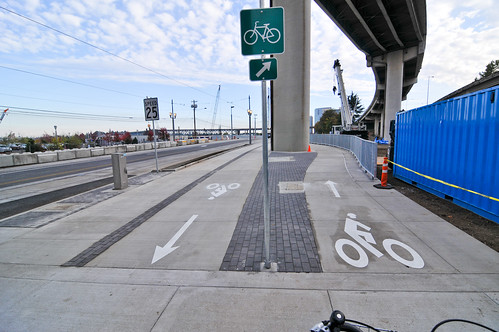
(Photos © J. Maus)
Yesterday, the SW Moody Project opened for business and I took my first ride on its cycle track.
This major project constructed a new, 0.6 mile elevated roadway from SW River Pkwy (under I-5/405 interchange) to SW Gibbs near the Aerial Tram. In addition to Portland’s first ever two-way cycle track, this segment of SW Moody also includes sidewalks on both sides and three standard vehicle lanes.
My overall impression after riding it in both directions yesterdays is that it’s pretty exciting — this is the closest thing Portland has to a European-style bikeway. The cycle track is separated and on a different grade than the roadway, the access is relatively direct (although it could be better in the southern section, more on that later), and there’s plenty of elbow room for both directions of bike traffic and people walking.
Check the photos and notes below for more…
On the north side, the access from the existing bike lane on SW Moody is straightforward and direct…
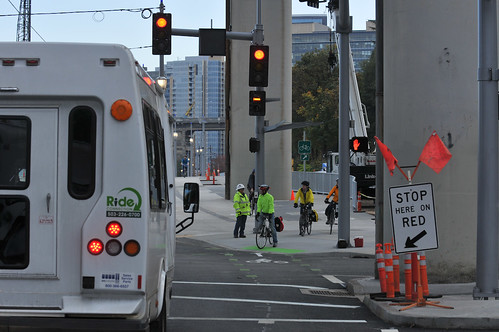
Once up and onto the deck you’ve got lots of room to ride….
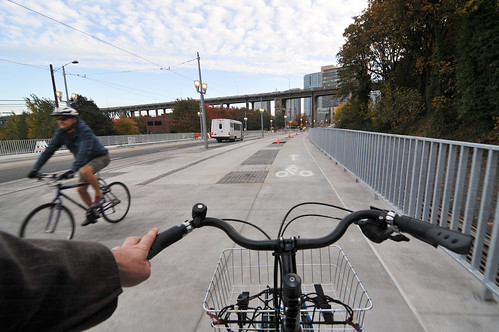
Then, under the Ross Island Bridge you come to yield triangles and crosswalk markings. What’s happening here (I think) is that the bike traffic lanes are supposed to criss-cross. Southbound bikes begin on right side and after this cross they are on the left side…
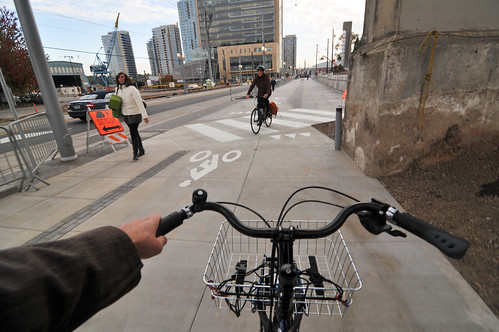
Nearing the end of the new segment is this bikeway sign. Pretty neat to see directions to the upcoming, carfree Gibbs Street bridge…
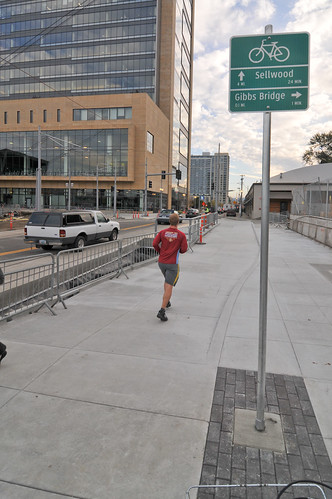
At the end of the new cycle track, southbound traffic is directed onto the standard bike lane and westbound (toward the tram) traffic is funneled into a crosswalk that leads to the OHSU Center for Health & Healing (CHH)…
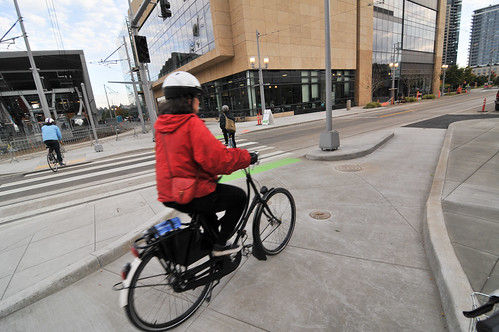
Now, let’s head northbound.
The existing bike lane turns into a ramp leading up to the sidewalk near the CHH. This doesn’t seem like the smoothest, most direct way to approach the new cycle track…
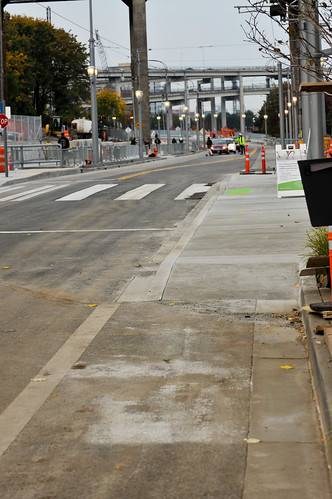
After heading up the ramp bike traffic must re-orient to cross via the crosswalk…
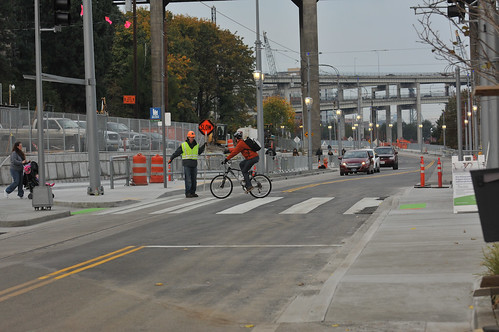
Once up and onto the cycle track, it’s smooth sailing all the way back to SW River Parkway…
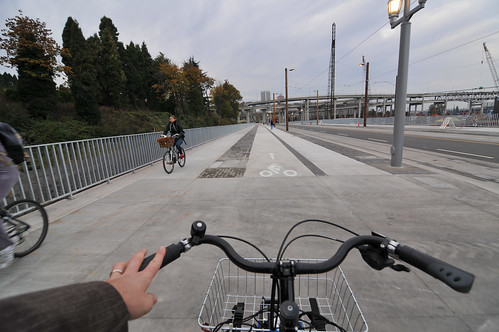
At the intersection of Moody and SW River Parkway, they’ve installed a new, bike-only signal to get you across the road…
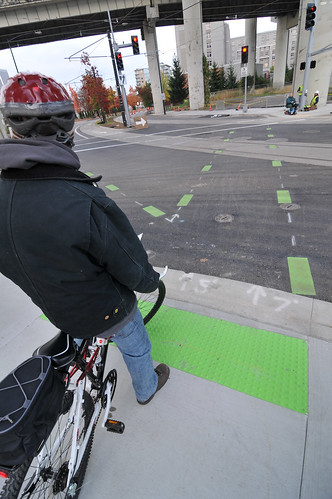
It’s important to note that there are still some bike symbols and other signage yet to be installed. Hopefully they address my main concern with this new facility — that there won’t be enough visual cues to separate people on foot from people riding bikes.
I’m also curious how foot traffic will be once the construction is fully completed. Seems to me it would have been wise to try and direct all foot traffic onto the east side of the street, since that’s where most of the destinations are and it would avoid conflicts with bike traffic. We’ll see how it all plays out.
As soon as it opened yesterday there was instantly a good amount of bike traffic. Have you ridden it yet? If so, please share your thoughts.
For another view, check out the short video below that I shot while biking northbound…



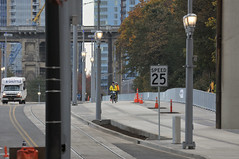
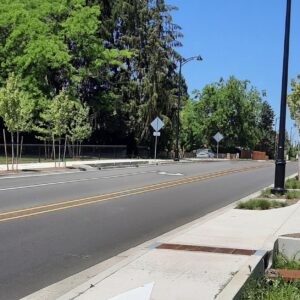
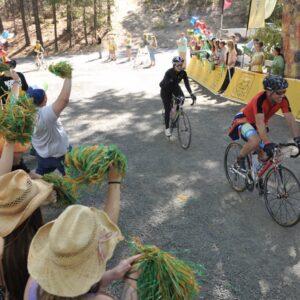
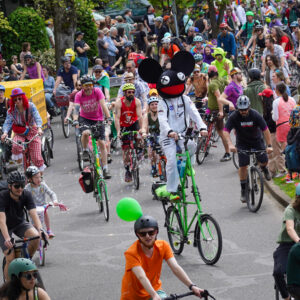

Thanks for reading.
BikePortland has served this community with independent community journalism since 2005. We rely on subscriptions from readers like you to survive. Your financial support is vital in keeping this valuable resource alive and well.
Please subscribe today to strengthen and expand our work.
WOW guys, looks great and with time, and a bit more green paint, should be a super addition to the much needed bike infrastructure. Wish I had something like this in MY town! SIGH Oh well, this too shall come to pass. Mabe I should just “chuck it” and move to Portland? LOL 🙂
Did I miss something? Is there a bad crossing that requires special attention? Green lanes mean it’s a high conflict location.
Also, given the chronic unemployment, high poverty rate and high cost of living, you can definitely do better than Portland these days. This city’s best days are long gone.
You’re talking just about anywhere these days… at least in Portland you have the potential to get around without a car.
Portland got hit especially hard. Oregon has a static sized economy. Add more people to that, everybody’s slice gets smaller. Combine that with the Bush Depression we’ve been stuck in since 2001, and Oregon really got the Perfect Storm.
Love it or leave it.
Working on it. Yet another native Portlander priced out of his own city. I won’t turn down donations to expedite the process.
I don’t think you’re out of line saying that. Truth hurts. There great things about Portland, there are terrible things about Portland. It’s not a land of rainbows and unicorns. But we’ve got pretty good bike infrastructure in some parts of town.
That’s true, we have great transportation infrastructure overall and amazing modal diversity compared to most of America. But the downside is jobs are hard to find and entertainment is scarce and expensive, so cruising (be it by bike or whatever other mode) is often the only consistently cheap entertainment readily available, so transportation ends up being an end in and of itself.
Do any of you think that maybe Portland’s in as bad a shape as it’s in because you’ve wasted so much money on trolleys, trams, light rail, and bicycle infrastructure that have drained money from more productive uses while sending the message to businesses that the city is getting harder and harder to navigate?
I spent an hour this afternoon walking around the riverfront. As I went back toward downtown, I passed several blocks worth of beautiful, but empty, old buildings. The derelicts walking nearby were picturesque, but they didn’t seem to have any money to spend.
I said to the Portland resident who was with me, why don’t any top restaurants or high-end stores move in here? He said, for one thing, you can’t drive down here easily, because Portland hates cars. For another thing, you wouldn’t want to walk around here, because Portland loves drunks and drug addicts.
When I was here a couple months ago, I read in the local paper that Portland hasn’t added any net private employment in more than a decade. My friend confirmed it, and said any economic growth that’s taking place is happening in outlying areas, away from the bike lanes and light rail.
Rode it last night. My main impression from the experience was, “Wow, it is really pouring.”
Pretty awesome really. The bike signal heading northbound worked great, and was really obvious thanks to the bumpy green crosswalk “mat.”
Wow, a median! Not sure I’ve seen one of those on a local cycleway before for any significant distance. In the undivided portions, looks like they haven’t put down the centerline yet; hopefully that gets done soon since relying on a pavement joint to do the job is a bit problematic.
I think that small crosswalk is actually the sidewalk crossing both of the bike lanes to go from the west side of the facility over to the east side (if you’re going North), or to cross from the East Side over to the West side (if you’re going South). I suspect that the bike lanes have to be on the East side of the facility at the South end in order to exit onto the street into the Southbound bike lane on Moody.
This facility looks and feels great to me. It’s definitely a step above anything else in Portland in terms of design, and it feels like absolute heaven after riding on that sidewalk for nearly a year.
It’ll be nice to see once all the signage and the planters and everything get finished off. I’m also curious to see what happens between Moody and the river once the rest of the roadway gets filled in and brought up to the level of this road.
Also, I must have been really right behind you yesterday, as I passed that same guy with his dog in the bike path 🙂
Looks interesting… I’m looking forward to checking it out for myself.
One concern that I saw in the photographs… Those wayfinding signs in the medians… Their posts might be hard to see at night and/or in the rain. I’d recommend that someone add some reflective material to the posts (say yellow and black, or red and silver) to make them stand out better against the grey of the concrete.
In the video, at 0:25 you can see how someone walking the dog could be enough of a distraction to cause a cyclist to plow into one of those signs.
The sign posts seem to me more of something we should see if it becomes a problem, and if it does, then do something about it. It would be a quick fix if it does turn out to be a problem, and it seems like something where, though I could perhaps see it happening occasionally, it’s not a big enough threat that it probably needs anything done unless it’s shown that sober, responsibly riding people have a tendency to run into them.
why should we have to wait for someone to have to get hurt when we can take a simple step to prevent it?
Because it’s probably not that big of a risk in the first place. Just my opinion. Not saying we absolutely shouldn’t do anything, just that I don’t think it’s probably much of a risk.
Just curious. Does the City of Portland listen to people who use the infrastructure? Is there a way to tell them about things like this so they can improve them?
we say this to car drivers all the time so I just have to…
don’t ride faster than you can see!
c(:
Interesting that they chose to put the trees between the two directions of bike traffic, and not between peds and bikes.
Also, ped area is too small. In the video, you can see people spill over into the bike area because people like to walk side by side.
Anyone who claims that “when peds and bikes get used to it, this conflict will end” should really check out other north-american cycle tracks. It wont ever end. pedestrians love to walk over big sidewalks…and why shouldnt they?
I think it looks great, but anyone looking to bike at 25+mph will hate it. Its a 10-15mph facility.
I’m just going to have to go out on a limb and say “boo hoo.” It’s called sharing the road with the rest of traffic. Even if all lanes happen to be restricted only to other bicycles, sometimes you’re just going to have to keep a safe following distance and wait it out.
some of you sound like you want the world to be padded in pillows to make life conflict and pain free.
how about slowing down and paying attention to what’s in front of you? I mean how many times have you accident prone souls run into stationary objects?
Approximately 1.1million times per year, at least a third of which were due to speed. Wait, you’re talking about the number of car crashes with stationary objects, right?
Here’s an example of one of those crashes…
http://flic.kr/p/arZYga
Now there’s yellow and black reflective material applied to the new post. I wonder how much money could have been saved if something had been done before someone hit hit?
I would have guessed the highly reflective “Keep right of median” sign would have been a dead giveaway.
Here’s what was put up to replace the damaged pole from the previous photograph…
http://flic.kr/p/aBXYKd
I think they just want their money worth out of an expensive new facility. It should be engineered for the slow and the fast alike, and the bugs should be pointed out and addressed.
I ran on the West side of the path with a friend today. Every other person walking or running was doing so in the bike lanes. Maybe after a while people will get it, but I can see why people on bikes might be frustrated with this.
Tulsa prints pedestrian logos on the sidewalks on their segregated cycleways to make it clear that it’s a sidewalk. Then again, Tulsa also doesn’t allow bicycles to use pedestrian facilities or vice versa, and does a good job enforcing this.
Sidewalks in Oklahoma are nearly nonexistent. One of the highest mileage per capita states in the union for auto commute’s. Not a surprise they have time to watch their pitiful supply of walkways with keen eyes.
Have you ever tried to walk anywhere in Oklahoma?
Yeah, I walked from BOK Center to 61st and Memorial in Tulsa, drunk, because I incorrectly assumed the TT would be running after a hockey game. Took five hours and I was sober by the time I got home. Walked along the roadway edge on sprawling lawns within the right of way wherever there weren’t sidewalks. Ideal? Hardly. ADA compliant? Not at all, much to the chagrin of the high number of disabled war veterans in Tulsa (I used to go grocery shopping with a Vietnam vet who couldn’t drive and lived on Memorial in a high-traffic location, making him pretty much entirely dependent on friends, the TT and taxis to get around).
Maybe as more people cycle, and Portland comes closer to achieving its goal of 20% of trips by bike, the narrow sidewalk simply won’t be an issue because more people will be cycling rather than walking. I must say though the facility looks a little underwhelming and overcomplicated– I’m not from Portland but it seems the city had a blank canvas to work with and decided on these strange crossings, divisions, and unnecessarily narrow bicycle and pedestrian facilities. Of course, only way to know is by seeing firsthand but that’s the impression I get looking at the pictures, and seeing the video. Can people comfortably cycle side by side on these facilities? Will a cargo bike take up the whole lane?
and with that 20% goal, it’s going to be imperative people learn cycling etiquette and improve their skills. Of course if a local bike shop reminds us of that, they will flogged and dragged through the mud for insulting the cycling community.
My thoughts:
– Holy crap is this better than the sidewalk
– Pedestrians, EVERYWHERE (and I couldn’t really tell where they were supposed to be either)
There’s going to be a sidewalk open on the other side, where most people will walk because all of the development will be on the east side of the street. Not really a reason for pedestrians to use the west side of the street once the other side is open, so pedestrian-bike conflicts likely won’t be a big issue.
This is a really good point – the only thing that will be west of the cycle track will be an elevated MAX line.
I’ll still be using the west sidewalk, because I work up the hill from there. And having a sidewalk go all the way up to Sheridan is lovely.
Yesterday at lunchtime there were way more pedestrians than would fit on the designated sidewalk. Having an eastside sidewalk should take some of the pressure off. Also, I suspect that the lunchtime mix is different from the commute hour mix, with more bikes morning and evening and more peds at noon. It’ll probably sort itself out fine.
Many streets in East Portland are unpaved. This project is cool looking, but it is yet another one built for the well-too-do that will help very few.
When you say “very few” are you referring to the 13,000 employees and students at OHSU, or 7,000 visitors?
You left out the 35,000 Portland State faculty, staff, and students. 🙂
Not to mention 5,000+ people who already live in South Waterfront. And the 30,000+ people who will ride the Milwaukie light rail and ride buses, cycle or walk over the new bridge.
Kind of a linchpin, eh?
All the bikelanes and sidewalks in East Portland isnt going to make it a great place to walk or bike.
If there’s going to be development on the other side how will people cycling access these developments? Why wasn’t the configuration so that cycle tracks were on each side of the street then?
I think there will be a couple of street intersections, where it will be possible to cross to the East side of the street.
Probably to avoid conflicts with automobiles and streetcars. Bikeportland tends to complain a lot about streetcar tracks and cycling.
Hopefully then can put little curb ramps at each block so that cross-traffic bicycles and peds (wheelchair bound) can roll up onto the wide sidewalk/cycletrack ROW.
I look forward to checking this wonderfull new facility out this weekend.
Though…some first impressions on the wonky side…I am not so sure about the expansion of the use of the “green” conflict colour to the truncated tile panels and the narrow (4″?) dashes for the marked bike crossing.
If its a bike only intersection crossing then it should not be designed [‘to feel’] like an ADA pedestrian sidewalk ramp – potentially confusing for the those with no or low sight or color blindness. (I assume there is a separate pedestrian crossing.) A steeper/ shorter bike ramp could also be used for a different look and feel.
And a higher visibility and likley more effective marked dashed bike crossing would a 8″ or 12″ white dash similar to those [elephants feet] used in the Netherlands.
A clarification…the better Dutch bike lane crossing (elephant footprint) dash is typically square and not a long dash.
http://www.flickr.com/photos/mindcaster-ezzolicious/2877302855/
http://www.flickr.com/photos/lisastown/3461144494/
I wonder if the order should be “motorized traffic, then pedestrians, then bikes by the edge railing” (as it is now) or if it should be “motorized traffic, then bikes, then pedestrians” by the railing.
I appreciate the smooth ride, separation from cars, lighting, and low probability of flooding. However, with > 50% of peds on the track, it seems more like a MUP with lane markings than a cycletrack. We’ll see how it rides with more signage…
That bike path criss-cross is interesting. From the design it is obvious that north-bound bikes have the right-away and south-bound (the direction faced in the picture) bikes must yield, but I can’t wait to see how many people don’t “get” that…
Rode it today for the first time. I thought it was pretty nice. The southern crossing could be better marked, but overall a nice path. I do think there maybe some issues with peds wandering into the bike lanes. But what’s new there? But it’s a big improvement from the crazy path of the past several months.
Moody, (Sidewalk and Northbound / Southbound striped street) prior to construction did a better job of segregating peds, runners, bikers, cars. Very disappointed in the engineering given the money spent..
the ‘money spent’ was mainly for the buried utility lines for the impending high rises north of the Ross Island bridge, raising the street, and installing another streetcar track.
Withhold judgement until the project has reached completion (late January).
While I can see why this facility might encourage more fearful riders, the design of this cycletrack reinforces my suspicion that the city of portland is building facilities that are *intended* to inconvenience and slow down accomplished cyclists.
My chief complaints:
Narrow lanes with barriers that are clearly *designed* to inhibit passing. The ridiculous and awkward interchanges that make travel slower and more awkward than the previous bike lane. These interchanges give the appearance of safety but IMO are less safe than the previous bike lane. The complete separation from Moody also sends a message that cyclists do not have a right to the road (mandatory sidepath on steroids). The beveled lip on cully, for example, gave cyclists the possibility of exiting into the road to pass obstructions.
I am very glad that I take the hill and can avoid this cluster ****.
You would hate Copenhagen.
No doubt. While a passing lane is nice, having some extra separation with the median that exists is nice given the high level of traffic this will get once it ties into the Willamette Greenway.
you should drive a car, you have the mentality of a motorist where racing through a place as fast as possible is all that matters, other people and neighborhoods be dam ned.
are you saying that riding faster than 15 mph on a major transportation route is tantamount to wishing “other people and neighborhoods be damned”. if so, it sounds to me like you don’t understand the concept of utilitarian cycling.
“you should drive a car”
ironically, few car-free utilitarian cyclists are upset by faster cyclists. the fair weather types on the other hand…
Looks this will be the end of cycle cross on Moody. It looks good and when all the signage is in place sharing should be obvious.
I have several comments in reaction to this project:
1) Why were both directions of cycle track put on one side of the street, requiring northbound cyclists to cross the street twice. It seems like a cycle track could have easily been built with one lane on each side of the street without really changing the space requirements.
2) Why does the ped and bike space switch sides? This seems unnecessary and confusing, leading to increased bike-ped conflicts.
3) It seems that there needs to be a clearer distinction between ped and bike space. Perhaps this will come with time and signage. Check out a similar project and solution in Montreal:
http://spacingmontreal.ca/2011/09/12/between-design-and-day-to-day-in-the-qds/
4) I disagree with Jonathan’s comment saying that peds should be relegated to one side of the street. Sidewalks on both sides of the street should be standard, always. Walking is the slowest form of transportation, but also the most accessible, so we should always give it the highest priority and provide the most direct access. In addition, peds will simply walk in the bikeway if you fail to provide adequate ped space on both sides of the street.
I was thinking about 2) a lot…this seems like it’s going to be the source for unnecessary conflict, especially since it looks semi-blind from the camera prospective. Also curious why the cyclist in that photo appears to be riding on the footpath.
It switches because, for most of the way, the pedestrian path is street-side, which makes sense, since they will be accessing the streetcar. However, at the North end, the cycle track has to exit out onto the street, so it has to cross the sidewalk in order to do so.
Sorry, South end, not North end.
It still seems like something could have been done so pedestrians cross at an intersection instead of midblock, preferably signalized to minimize conflict.
The bigger problem so far seems to be that people walking tend to just stay on the street-side the whole way across, which makes sense, since that’s usually where the sidewalk is – once people figure out that part of the sidewalk is actually away from the road, I don’t see this little crossing being a big issue, maybe a minor annoyance sometimes, but nothing serious. Just means you have to watch what’s going on like at any other crossing.
withhold all the premature judgment folks. the project isn’t done yet. come back in late January before you get your critique on. some of these markings may very well be temporary since the east sidewalk isn’t complete yet.
I agree with several others here that the cross section by mode seems rather odd. It seems like it would be safer and more comfortable if peds had the far west edge, separated by the landscaped buffer, and bikes had the 2 inner tracks. I had it in my head that that WAS the design and actually had to go to the project website to check and see if they placed the wrong symbols. But it was built to spec. I suppose if the current configuration doesn’t work, that would be a fairly cheap adjustment.
I rode this the other day and was pretty psyched about it. It’s short for sure, but I think it’s a good attempt at separating bikes in a way that feels safe but doesn’t unduly sacrifice the directness of a route.
The only potential ickiness I saw was going southbound after you get off the path and back into the normal bike lane. There are some parts with streetcar to the left and parking to the right–and when I was there, a lot of the parking space was full of large trucks overlapping into the bike lane. Which made for a nasty squish between truck and streetcar. (pictures at the end of the post here: http://www.carfreerambles.org/2011/11/willamette-greenway-trail/)
But again, that’s not the cycle path itself, just the bike lane once you get off the path. If paths like these went for longer stretches, they would be the best thing ever.
Head cam on your Christmas list BikePortland?
This is super gnarly, and when they get the sinage figured out, it’ll be better.
I do have to say, that is an awful lot of concrete. The bio-swale for that must be huge.
I think this is going to be a huge problem. I’m going to hold judgement on the path as a whole since there are a lot of things that aren’t completed yet (and I applaud PBOT for getting this open as soon as they did) but that bike X-over is going to be an enormous clusterf*** come next June when bike commuting so So Waterfront picks up again. I’ve now ridden it a few times (I rode it every day through the summer, towing my daughter along in the Burley…she’s since changed schools so I only ride it once a week) and I don’t really love it. Heading south, that X-over is blind to anybody moving at >10mph and I anticipate a fair # of crashes there during the peak season. I’m actually planning to use the street southbound since there are two lanes there.
sorry but dutch cyclists are not known for their adherence to traffic laws and rules.
While this is a good question to have discussion on, I disagree with the implication that these things are a drain. This kind of infrastructure is long overdue so right now they’re catching up. Driving a car is becoming difficult to do in cities where there isn’t any of this so adding space for other modes hasn’t caused the difficulty in driving there.
I think Portland is just not a big centre for the country, that’s all. If the economy is slow, then it shouldn’t be blamed on a few bike lanes and a few drunks. You’ll find those anywhere.
imo, cycling slowly on a heavy city bike is not a skill, its a limitation.
As long as you don’t treat me like an obstacle for riding slowly on a heavy city bike, that’s fine. Not everyone considers that a limitation.
I don’t.
Thanks, I honestly appreciate it 🙂
What money was wasted? We invested in our infrastructure before it was cool to do so. We diversified transportation modality. Our economy sucks because we have too many people in an economy that is inelastic and doesn’t really grow or shrink in good times or bad. It’s easier than ever to navigate Portland because we’ve diversified the infrastructure. Now, Vancouver, on the other hand, has painted themselves in to a corner, fighting any attempt at spreading this across the river, much to that city’s loss, especially in downtown. You want to see empty derelicts? Go to downtown Vancouver.
When I’ve been to Portland (and my friend who lives there agrees with me, as do the numbers) it seems as if the main vitality is in Hillsboro and Beaverton, away from the the “diversified transportation modality” that you mention.
I am told that a lot of people are afraid to ride the light rail because of high crime. Downtown Portland seems attractive from a distance, but up close it has the feel of an adult day care center. The city is visibly poorer than Seattle or San Francisco.
To say that this is because the economy is “inelastic” tells me only that you remembered a term from an economics class, as opposed to what it actually means. As a visitor, I find then city harried and tense on the roads, and far easier to get around in the suburbs. Maybe that’s why the job growth, such as it is, has occurred there.
But don’t listen to an outsider. Listen to your friends, who like the “diversified transportation modality” but are leaving because they can’t find work. I think something has gone badly wrong there, and for quite some time.